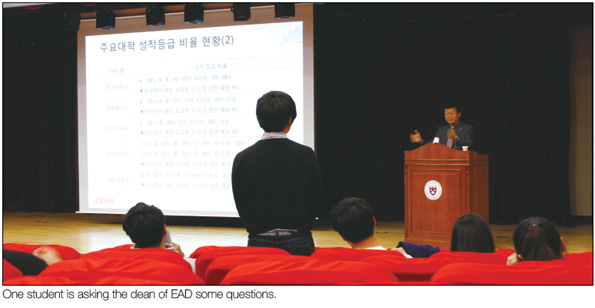
Recently, complaints about the reformed grading system have skyrocketed from CBNU students. In fact, the first reformed grading system was released last year, and at that time, CBNU Educational Affairs Department(EAD) just held a briefing on it. However, unlike last year, the public hearings on the second reformed grading system were held on April 27 and May 3.
In the first reformed grading system, the clause indicating that ‘the rate of combining As, Bs and Cs has to be 90%’ aroused much controversy because, according to this clause, 10% of students can’t help receiving Ds or Fs in their classes. Some professors and students raised an objection to it, but CBNU didn’t take any action about the objections.
In response to the continuous complaints, EAD decided to make a second grading system. The big difference between the first one and the second one is that the clause indicating that ‘the rate of combining As, Bs and Cs has to be 90%’ was deleted in the second one. However, in the public hearings, students and EAD held differing views on the type 2 grading system. The type 2 grading system increases the rate of As to 35% and includes ‘subjects related to education or certification’, ‘seminar subjects’, ‘foreign language-speaking subjects’, ‘prerequisite subjects for the graduate students’, ‘subjects of practical techniques’, ‘experimental subjects without lectures’ and ‘classes with less than 10 students’.
EAD held the first public hearing on April 27. Actually, the CBNU student council conducted a campaign where students were asked to sign a petition that EAD has to accept students’ opinions when making a grading system. About 7,000 students took part in the campaign, and the CBNU student president handed the paper to the dean of EAD. After the first public hearing, many students insisted that a second public hearing be held for the students who couldn’t attend the first one, so the student president asked the dean to hold a second public hearing, and the dean accepted the proposal.
Since the clause indicating that ‘the subjects related to education or certification are included in the type 2 grading system’ was deleted, the Education Department students made a strong protest. Cho Han-seo(’15, Dept. of Korean Education), said, “In the case of Education Department students, we are required to take 22 credits in subjects related to education in order to become a teacher, and if our grade point average in those subjects is lower than B0, we will be stripped of the qualification to become a teacher. I don’t understand why the clause was deleted afterwards.” And Jeon Myeong-jae(’10, Dept. of Korean Language and Literature), said, “Considering the case of a class where there are 11 students, the fact that the number of students for the type 2 grading system is fixed at less than 10 students can bring an overheated competition among students.”
There were also some complaints about the dates of the public hearings. Jang Hong-seon(’14, Dept. of Public Administration), said, “Both dates of the public hearings were set without students’ opinions. As a result of it, many students couldn’t attend the public hearings, and the briefing for the first reformed grading system was also held during the final exam period last year, which resulted in the same situation as now.”
In response to all these questions, the dean of EAD said, “First, the second reformed grading system still has many flaws, and we haven’t applied it yet. Therefore, we still have enough time to discuss it, and we will keep accepting as many opinions as possible while fixing it. Speaking of the actual advantages of the grading system for students, thanks to it, we could get a good score in the University Restructuring Project. In addition, we could be selected as a recipient in the Core Project. As a result of it, CBNU will be able to receive 26 million one a year for 3 years. The fund will be used for many students.”
In the second public hearing, the student president said, “EAD should provide the students with accurate data about the benefits that the grading system can bring and take account of students’ opinions when they legislate something.”
By Lee Seong-ho
shl36@cbnu.ac.kr


 All
All Campus News
Campus News






 Lee Seong-ho
Lee Seong-ho











